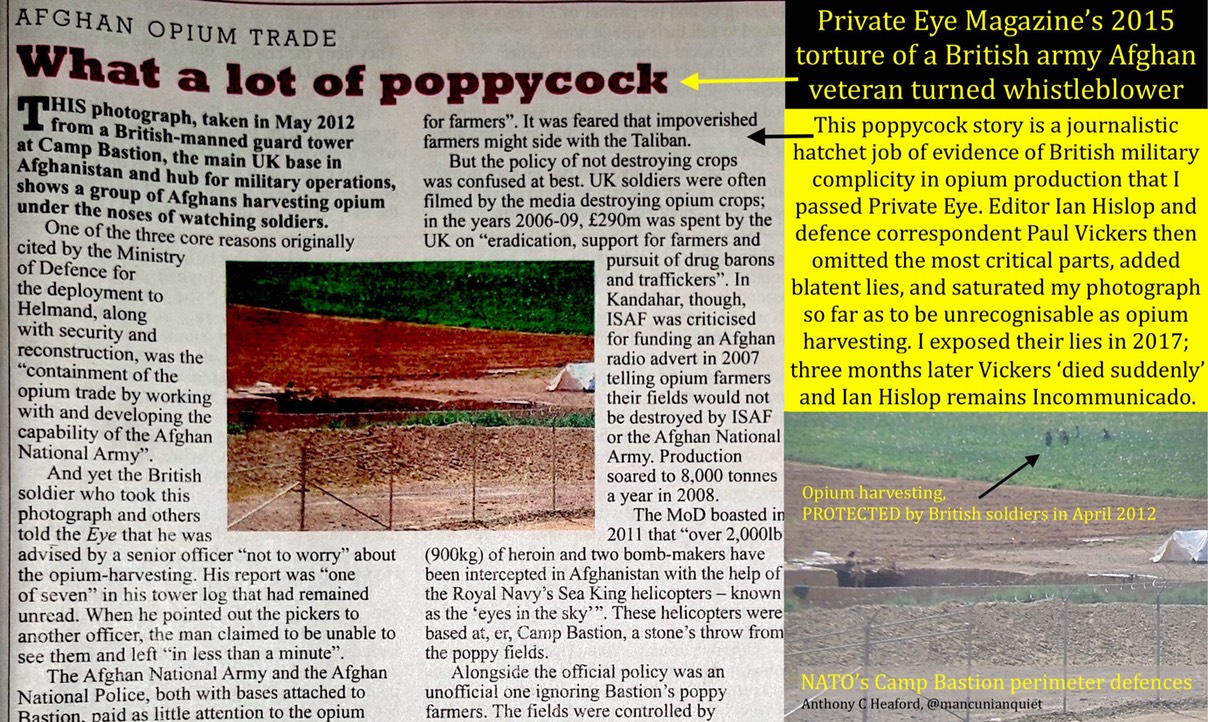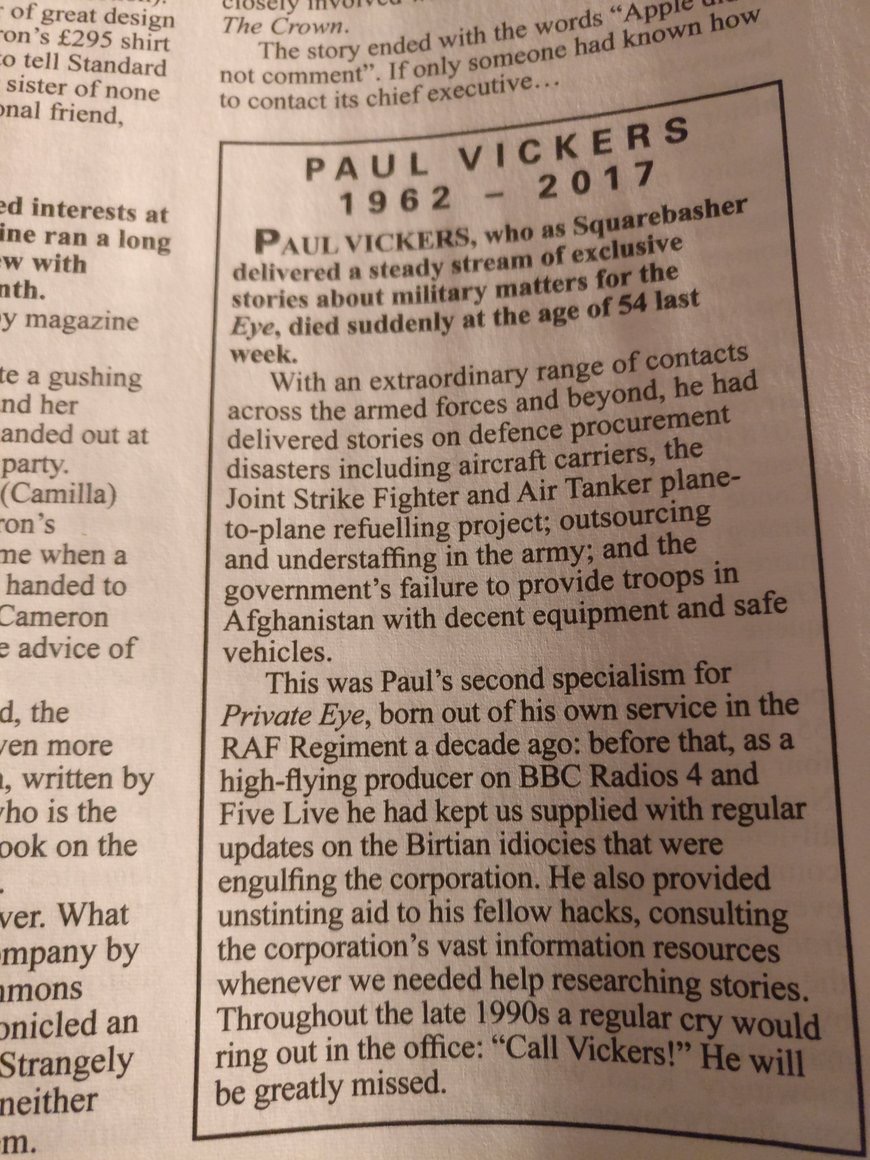by Anthony C Heaford, July 2022
Private Eye magazine’s defence correspondent, Paul Vickers 1962 - 2017
In October 2017, just three months after I’d exposed Private Eye magazine’s defence correspondent’s clumsy lies intended to hide British military complicity in Afghan opium production, that correspondent ‘died suddenly’ aged fifty-four.
In 2015 Paul Vickers, writing for Private Eye magazine (PEm) under the pseudonym ‘Squarebasher’, had taken my first-hand evidence and testimony of British complicity in opium production then wrote a hatchet job full of lies, omissions and distortions intended to coverup senior army officers blatant criminality. PEm’s editor Ian Hislop published the shameful article and then stood firmly by Paul Vickers’ fictional article when I complained about its inaccuracies.
It took me two years to find the irrefutable evidence I needed to expose Vickers’ lies, but I decided to test Hislop once more before presenting that evidence. Hislop failed my test miserably as he continued to stand by Vickers’ hatchet job with a patronising and demeaning emailed reply to me. I responded in July 2017 by emailing PEm the irrefutable evidence of the lies Hislop had published; Vickers ‘died suddenly’ three months later, in October 2017. Hislop has remained incommunicado ever since. PEM has failed to publish a correction or retraction and Hislop has still not apologised for what amounts to his psychological torture of a British army Afghan veteran turned whistleblower - me.
Background
During my Summer 2012 service with the British army in Helmand, Afghanistan I spent twenty-four hours protecting opium harvesting during a guard duty on the perimeter of Camp Bastion’s airfield. My orders were to report any Afghan security forces entering the area where the opium harvesting was occurring; we were told the Afghan security forces were harassing the farmers there - farmers who were growing poppies & producing opium.
On exactly the same day 170-British soldiers were on Operation Shafuq, helping to destroy poor farmers poppy crops just fifteen miles south of where I was protecting the opium harvest on Afghan government land besides Camp Bastion. Operation Shafuq was a charade, a mission everyone knew had failed twenty-four hours before it’d begun when the Afghan units deployed to the operational area a day early, alerting any enemy there to the impending operation. But British officers still went ahead with the mission, risking soldiers lives for nothing more than a box ticking media event.
I reported my concerns about the opium harvesting and the implications to the security of Camp Bastion during that April 2012 guard duty but was mocked and ignored by my Battalion (4 Armoured CS Bn REME) second in command - a very senior officer. He and another officer reacted by laughing, pretending not to be able to see the five hectare poppy field in front of the tower and then running away whilst still giggling like schoolboys.
The American command were aware of the poppy fields and were considerably more concerned. Major General Sturdevant of the US Command later stated:
"We literally had poppy growing right up against the perimeter fence. That was another thing that Maj. Gen. Gurganus tried to take action on, but he wasn't able to accomplish that. It was because the Afghans had to do it. We weren't allowed to. The biggest external threat to the base came from there.”
Major Sturdevant’s statement was published by a British parliamentary inquiry, in paragraph thirty-six linked here.
That external threat to the base manifested itself on 14 September 2012. Fifteen heavily armed Taliban breached our defences unseen, WALKED between our guard towers and then proceed to inflict the greatest material damage the US army had suffered since the Vietnamese Tet Offensive of 1968. Two US Marines were also killed-in-action during the attack - Lt Col Christopher Raible and Sergeant Brad Atwell. I’d been on guard duty seven days before the attack and had clearly seen our defences being probed and what appeared to me to be the preparations for an attack. I repeatedly reported my concerns on that guard duty but was repeatedly dismissed, being told:
“Don’t worry, Mohammed Daoud controls this valley”
By April 2015, frustrated by the British military, parliament and government’s refusal to investigate my allegations of the British army’s duplicitous complicity in Afghan opium production and its contribution to the success of the Taliban’s 2012 airfield raid, I attempted to become a public whistleblower. But instead of finding a mischief of journalists on my doorstep vying for my exclusive photographic evidence, I met a stoney silence from the mainstream media. And that’s when I turned to PEm with my evidence and testimony.
The PEm office responded by putting me in touch with their defence correspondent Paul Vickers who assured me he would tell my story. I told him about the ‘Mohammed Daoud’ who British officers said controlled the valley and guaranteed our security. I speculated that Mohammed Daoud might be the former governor of Helmand, but I was clear I had no evidence of this beyond my speculation.
PEm ran Vickers’ article, but hidden away on an inside back page rather than as a cover story I thought it deserved. Vickers reported it was the former governor of Helmand who control the valley, later saying he’d confirmed this with two sources - an ‘Australian and a Canadian’. Ian Hislop was happy to accept that incredibly vague confirmation but I remained very dubious. My doubts were eventually validated when I found this report from by the US military showing ‘Daoud Mohammed’ at a shura (meeting) on the land besides Camp Bastion. But instead of it being Helmand province governor Mohammed Daoud, the photographs showed it was Washir district governor Mohammed Daoud Noorzai.
August 2011: Washir district governor Mohammed Daoud Noorzai at a shura on the land he
controlled besides Camp Bastion, accompanied by British, US and Afghan military officers:
I had my conclusive, irrefutable evidence that Paul Vickers and Ian Hislop had concocted
and published a pack of lies. Those lies were specifically intended to protect the British
military from criminal charges over its absolute complicity in opium production from poppy
fields that we not only secured but irrigated with water purified inside Camp Bastion too.
Conclusion
Private Eye magazine editor Ian Hislop and defence correspondent Paul Vickers produced and published an article intended to psychologically torture a British army Afghan veteran turned whistleblower (me), and to protect senior British military officers from prosecution for their complicity in the production of a Class A drug.
After their malicious and immoral journalistic corruption was exposed by me, PEm did not retracted or corrected their original article and failed to respond to further communications.
Three months after I had proved their guilt beyond all doubt, PEm defence correspondent Paul Vickers ‘died suddenly’. It is my belief that Ian Hislop will have given Vickers hell after their clumsy lies were exposed by me, possibly destroying any professional credibility Vickers had left and effectively ending his career.
Vickers was already a troubled man and I suspect my actions to expose his corruption, and Ian Hislop’s reaction, caused him to stop taking his asthma medication - something he knew would result in his untimely demise.
Annex
PEm 2015 published article “What a lot of Poppycock”:
My 29 June 2017 email sent to PEm, stating their error & my suggested resolution:
07 July 2017 PEm editor Ian Hislop's patronising reply to me, FULL OF LIES:
12 July 2017, my irrefutable evidence emailed to Ian Hislop & Paul Vickers:
October 2017: PEm obituary for Paul Vickers:
An informal obituary for Paul Vickers published on an anonymous military chat forum:


